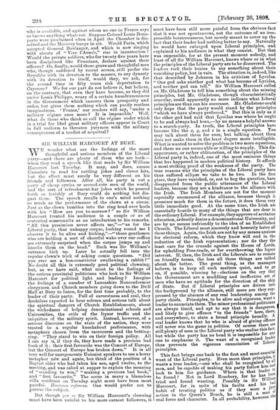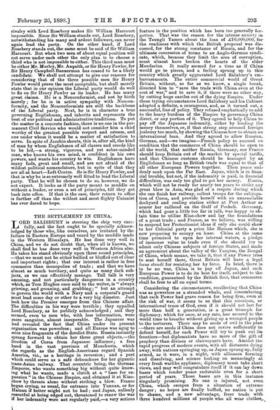SIR WILLIAM HARCOURT AT BURY.
WE wonder what are the feelings of the more thoughtful and serious members of the Liberal party—and there are plenty of them who are both— when they read a speech like that made by Sir William Harcourt last Tuesday. It may, and does, amuse Unionists to read his rattling jokes and clever hits, but the effect must surely be very different on his friends and followers. After all, his party is not a party of cheap cynics or second-rate men of the world, and the sort of refreshment-bar jokes which he poured forth so lavishly at Bury could do nothing but dis- gust them. The speech recalls to one's mind nothing so much as the performance of .the clown at a circus. Just as the clown tumbles into the ring head over heels with his "How are you to-morrow ? " so Sir William Harcourt treated his audience to a couple or so of oratorical somersaults as an introduction to his remarks. " All this pessimism never affects me,"--" as for the Liberal party, that unhappy corpse, looking round me I observe it to be alive and kicking,"—" those gentlemen who are holding a sort of cheerful wake over our coffins are extremely surprised when the corpse jumps up and knocks them on the head." Such was Sir William's entrance kick up. Later he actually fell into the regular clown's trick of asking comic questions. " Did you ever see a boa-constrictor swallowing a rabbit ?" No doubt all this is extremely good political clowning, but, as we have said, what must be the feelings of the serious provincial politicians who look to Sir William Harcourt for political light and leading ? Imagine the feelings of a number of Lancashire Nonconformist clergymen and Church members going down to the Drill Hall at Bury to listen, for the first time probably, to the leader of their party. Full of earnestness and zeal, they doubtless expected to hear solemn and serious talk about the spiritual dangers of Church Establishments, about the wickedness of helping denominational schools and Universities, the evils of the liquor traffic and the iniquities of the military spirit. Instead, however, of a serious discourse on the state of the nation, they were treated to a regular knockabout performance, with metaphors chosen from the racecourse and the betting- ring. " They stand to win on their foreign policy. All I can say is, if they do, they have made a precious bad book of it ; their first favourite was the Concert of Europe, but the Concert of Europe has broken down." It is all very well for unregenerate Unionist speakers to use a horsy metaphor ndw and again, but think of the position of a Baptist elder who had taken his son, aged twelve, to the meeting, and was asked at supper to explain the meaning of " standing to win," " making a precious bad book," and "first favourite." The scene in many a blameless villa residence on Tuesday night must have been most painful. Horresco referens. One would prefer not to pursue the subject.
But though per se Sir William Harcourt's clowning must have been painful to his more earnest followers, it must have been still more painful from the obvious fact that it was not spontaneous, not the outcome of an irre- pressible boisterousness, but merely meant to cover up the fact that their leader had nothing better to say. Naturally he would have enlarged upon Liberal principles, and explained to his audience in what they consist. But that was impossible, for at the present moment nobody, and least of all Sir William Harcourt, knows where or in what the principles of the Liberal party are to be discovered. The leaders rack their brains to say something about their vanishing policy, but in vain. The situation is, indeed, like that described by Johnson in his criticism of Lycidas. " One god asks another god what has become of Lycidas, and neither god can tell." Sir William Harcourt called on Mr. Gladstone to tell him something about the missing principles, but Mr. Gladstone, though characteristically oracular, could apparently no more indicate what Liberal principles are than can his successor. Mr. Gladstone could only hope that the party would stand by the principles "which we have always professed." But this is only as if the other god had said that Lycidas was where he ought to be and always had been,—by no means a helpful answer to a search-party. In truth, the Liberal principles have become like the x, y, and z in a single equation. You may talk about them for ever, but talking about them does not make them in the least degree more intelligible. What is wanted to solve the problem is two more equations, and these no one seems able or willing to supply. This dis- appearance, or rather obliteration, of the principles of the Liberal party is, indeed, one of the most ominous things that has happened in modern political history. It affords a most striking proof of the weakness of the party. The true reasons why the principles of the Liberal party have thus suffered eclipse we take to be two. In the first place, they have vanished, or, not to beg the question, have disappeared from the public utterances of the Liberal leaders, because they are a hindrance to the alliance with the Irish. The Irish Members are not for the moment especially enamoured of the alliance, because though it promises much for them in the future, it does them very little immediate good. At the same time, the Irish are essentially hostile to many of the things that are dear to the ordinary-Liberal. For example, they approve of sectarian education, ardently desire a denominational University, and are by no means unfriendly to the idea of an Established Church. The Liberal most sincerely and honestly hates all these things. Again, the Irish are not by any means anxious for electoral reform, which they know will end in the reduction of the Irish representation ; nor do they the least care for the crusade against the House of Lords, for upholding Free-trade, or for overthrowing the liquor interest. If, then, the Irish and the Liberals are to remain on friendly terms, the less all these things are talked about the better. The great thing, as the managers believe, is to keep all such matters quiet, and to go on, if possible, winning by - elections on the cry that the Government are a muddling and ineffective set of men who have no aptitude for the direction of the ship of State. But if Liberal principles are driven into the background by the alliance, still more are they sup- pressed by the absence of any real leadership among the party chiefs. Principles, to be alive and vigorous, want a leader to enunciate them. The minor professional politicians are always timid, and apt to say that it is dangerous, and likely to give offence "to the friends" here, there, and everywhere, to state a broad principle broadly. A real leader knows that he who is afraid of giving offence will never win the game in politics. Of course there are still plenty of men in the Liberal party who realise this fact, but while the party has no head it is impossible for any one to emphasise it. The want of a recognised leader thus prevents the vigorous enunciation of Liberal principles. This fact brings one back to the first and most essential., want of the Liberal party. Even more than principles, wants a true leader,—one who shall be recognised. by al,' men, and be capable of making his party follow him and look to him for guidance. Where is that leader be found ? Not in Lord Rosebery, for he has been tried and found wanting. Possibly in Sir Wilbam Harcourt, for in spite of his faults and his bad _ habit of treating politics as if they were a fury action in the Queen's Bench, he is still a man .1). real force and character. In all probability, however, the rivalry with Lord Rosebery makes Sir William Harcourt impossible. Since Sir William stands out, Lord Rosebery, notwithstanding his many and ardent followers, can never again lead the party. On the other hand, if Lord Rosebery stands out, the same must be said of Sir William Harcourt. But when two men of about equal position will not serve under each other the only plan is to choose a third who is not impossible to either. This third man must be either Mr. Morley, Mr. Asquith, or Sir Henry Fowler, for Sir Henry Campbell-Bannerman has ceased to be a likely candidate. We shall not attempt to give our reasons for considering that of the three possible men Sir Henry Fowler would prove the most acceptable, but shall merely state that in our opinion the Liberal party would do well to fix on Sir Henry Fowler as its leader. He has many great claims. He is a Nonconformist, and not by birth merely ; for he is in active sympathy with Noncon- formity, and the Nonconformists are still the backbone of the Liberal party. Next, he is in character a true governing Englishman, and inherits and represents the best of our political and administrative traditions. To put the matter in a concrete fashion, there is no one in the per- manent Civil Service who would not consider him a chief worthy of the greatest possible respect and esteem, and one under whom it would be a matter of satisfaction to serve. In spite of Jacobin shouts, this is, after all, the kind of man by whom Englishmen of all classes and creeds like to be led,—a strong, vigorous, and yet sober-minded man, who knows his own mind, is confident in his own powers, and wants his country to win. Englishmen have many fads, great and small, and are not afraid of the wildest political nomenclature, but in spite of that they are all at heart—Left Centre. So is Sir Henry Fowler, and that is why he is so extremely well fitted to lead the Liberal party. That he will be chosen to do so, however, we do not expect. It looks as if the party meant to muddle on without a leader, or even a set of principles, till they get back into office. If that is the case, their return to office is further off than the wildest and most flighty Unionist has ever dared to hope.







































 Previous page
Previous page